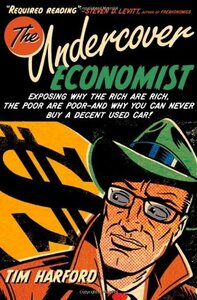Take a photo of a barcode or cover
informative
reflective
medium-paced
An interesting read if you're not that familiar with economic theory... but if you aren't, why would you start here? I was hoping for more of an "everyday" approach to economics (why coffee is expensive at Starbucks, why you can't find cheap used cars, etc) and the digressions into nationalized health care and world economic policy weren't exactly light reading. That said, the more small-scale stuff that did make it into the book was pretty good. But I'd stick with Freakonomics instead of this one.
challenging
funny
informative
reflective
slow-paced
slow-paced
hopeful
informative
medium-paced
adventurous
challenging
hopeful
informative
reflective
fast-paced
informative
slow-paced
This book was an attempt to read something out of my usual comfort zone. And also a small starting step towards the quest of writing a review for every single book I read (really helpful for myself too because I forget the contents of a book I finish terrifyingly fast O.o). Well, to say it right from the start "The Undercover Economist" wasn’t as bad as the rating suggests. I felt compelled to only give it 2 stars after comparing it to all the other books in my collection, when some were actually really good and only got a rating of 3 stars!
I had quite some trouble getting through the book, maybe because of the topic (I’m not such a huge fan of economics) or maybe due to the author’s slacking style (at some point he was just getting way too complicated)… The most surprising thing to me was when I finished the "Undercover Economist" and made a list of what I thought of it, the things I liked outweighed the ones I didn't like!! This lead to my conclusion that even though there were only a few bad parts in it, those were so bad, that they are responsible for making the overall rating so low.
After reading the book you do get a nice overview over all the major theories and most important key aspects of economics. It is written in an entertaining style, with lots of "taken straight out of daily life" examples and it is much more fun to read than any "schoolbook-economics-explanations"!
Here the parts I really enjoyed, finding out about: who pays for your coffee, what supermarkets don't want you to know, the "inside story" (background information about health insurances), why poor countries are poor, how China grew rich and the chapter "Beer, Chips & Globalisation" (dealing with the pros & cons of globalisation and actually offering possible solutions towards global and environmental problems). And here the ones which messed everything up: a chapter about "rotten investments" (an explanation of banking crises in excruciatingly long details) and the chapter "the men who knew the value of nothing" (covering the subject of auctions and all the little things which can be done wrong about them... yawn!).
This was actually the most memorable part of the book to me: how to order cheaper coffee at Starbucks! This probably isn't anything new to US readers but here in Europe the "short cappucino/ caffe latte/ espresso" seems to be well hidden. I tested it in Austria and it worked! The size is about the same as a normal "tall" but there's more coffee in it and seems to be much tastier! And it's cheaper too! So it could even go by the slogan "make it short, make it tasty, make it cheap"!
I had quite some trouble getting through the book, maybe because of the topic (I’m not such a huge fan of economics) or maybe due to the author’s slacking style (at some point he was just getting way too complicated)… The most surprising thing to me was when I finished the "Undercover Economist" and made a list of what I thought of it, the things I liked outweighed the ones I didn't like!! This lead to my conclusion that even though there were only a few bad parts in it, those were so bad, that they are responsible for making the overall rating so low.
After reading the book you do get a nice overview over all the major theories and most important key aspects of economics. It is written in an entertaining style, with lots of "taken straight out of daily life" examples and it is much more fun to read than any "schoolbook-economics-explanations"!
Here the parts I really enjoyed, finding out about: who pays for your coffee, what supermarkets don't want you to know, the "inside story" (background information about health insurances), why poor countries are poor, how China grew rich and the chapter "Beer, Chips & Globalisation" (dealing with the pros & cons of globalisation and actually offering possible solutions towards global and environmental problems). And here the ones which messed everything up: a chapter about "rotten investments" (an explanation of banking crises in excruciatingly long details) and the chapter "the men who knew the value of nothing" (covering the subject of auctions and all the little things which can be done wrong about them... yawn!).
This was actually the most memorable part of the book to me: how to order cheaper coffee at Starbucks! This probably isn't anything new to US readers but here in Europe the "short cappucino/ caffe latte/ espresso" seems to be well hidden. I tested it in Austria and it worked! The size is about the same as a normal "tall" but there's more coffee in it and seems to be much tastier! And it's cheaper too! So it could even go by the slogan "make it short, make it tasty, make it cheap"!


